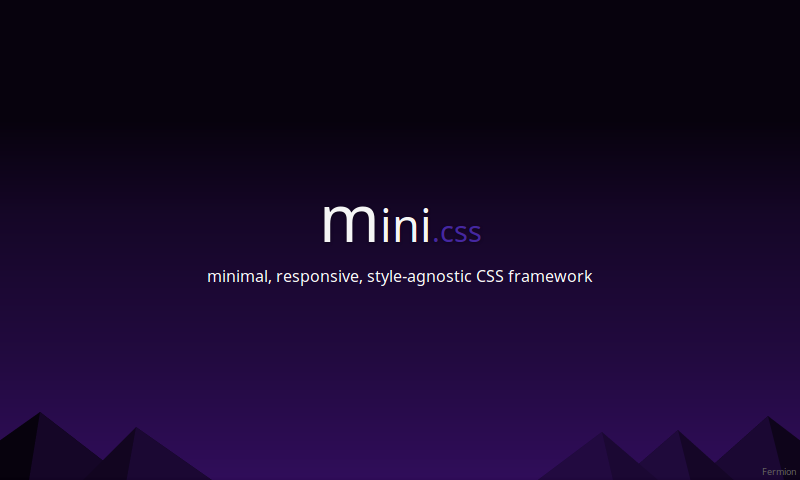5.8 KiB
mini.css
A minimal, responsive, style-agnostic CSS framework
mini.css is a lightweight CSS framework (under 7KB gzipped) designed with mobile devices and modern browsers in mind. Responsiveness, ease of use and customization are some of the main features of the framework, while accessibility and extensive documentation are some of the secondary focuses of the project. The framework is written using Sass, while most of its components are based on Flexbox.
Setup & usage
You have 4 options when it comes to setting up mini.css:
- Use a package manager (recommended)
- Use GitCDN
- Use Rawgit
- Use cdnjs (preferred for older releases)
For instructions on how to use, best practices, templates and other usage information, please visit the framework's documentation.
Method 1: Use a package manager (recommended)
- Install mini.css using
npm,yarnorbower.
npm install mini.css
yarn add mini.css
bower install mini.css
-
Pick one of the available flavors and use its CSS file.
-
Start working on your project. Detailed documentation is available on the framework's website, so be sure to check it out.
Method 2: Use GitCDN
mini.css is also hosted on GitCDN, an open-source service, so you can easily grab the latest release's distributables. Simply link to your preferred flavor inside your HTML page's <head> tag:
<link rel="stylesheet" href="https://gitcdn.link/repo/Chalarangelo/mini.css/master/dist/{mini-flavor}.css" />
Remember to replace {mini-flavor} with the flavor's name (e.g. mini-default or mini-default.min for the default flavor).
Method 3: Use RawGit
mini.css is also hosted on RawGit, another open-source service, so you can easily grab a specific release's distributables. Simply link to a release and your preferred flavor inside your HTML page's <head> tag:
<link rel="stylesheet" href="cdn.rawgit.com/Chalarangelo/mini.css/{release-tag}/dist/{mini-flavor}.css" />
Remember to replace {release-tag} with a release from the Releases page and {mini-flavor} with the flavor's name (e.g. mini-default or mini-default.min for the default flavor).
Method 4: Use cdnjs (preferred for older releases)
If you would rather use an older version of the framework, you should head over to cdnjs for a list of releases and flavor files supplied with them.
Flavors & customizaton
Flavors are one of the key features of mini.css, allowing you to customize your website's design and make your project stand out. We provide you with a few pre-defined flavors that might suit your needs and will help you figure out how to use the framework and create websites and apps with it.
But you can easily build you own flavors by editing a flavor file and customizing almost everything. For more information, head over to the Customization page and build your own flavor the way you like it.
Contributing
-
Have you found a bug in the framework? Do you want to request a new feature or suggest a new flavor? Maybe found some documentation that is unclear or incomplete? Open an issue and we will be with you shortly.
-
Have you developed a new flavor and want to share it with the world? Open an issue about it, so that we can link to your repository from the framework's documentation and let the world know. We will try to keep you posted on any new releases coming, so that you can update your flavor as necessary.
-
Have you developed a module for the framework? Well, we don't really accept new modules right now, but if it works, we will certainly tell people that it's available. Open an issue about it and we will figure it out together.
Maintainers & contributors
The team behind mini.css is as follows:
- Angelos Chalaris (@chalarangelo) - Sass archmage, project manager
Special thanks to these fine folks for helping in the development of mini.css:
- Angeliki Daskalakis (@angiedaskalakis) - Author of the Sucroa flavor
- @tphecca - Author of the Nord flavor
- Rory Primrose (@roryprimrose) - Code restructure
- Sandro Magi (@naasking) - Multiple suggestions, ideas, bug reports
License
mini.css is an open-source framework and is licensed under the MIT License.



